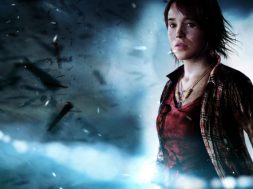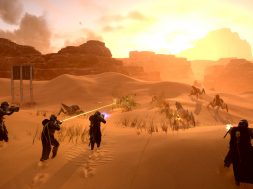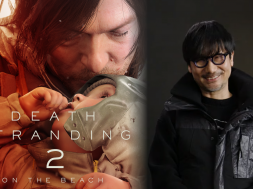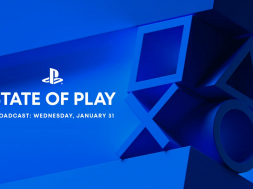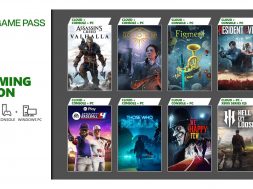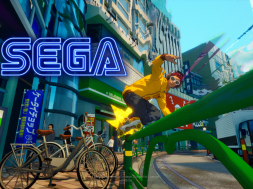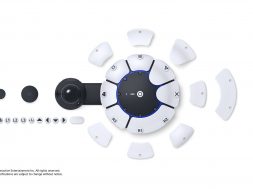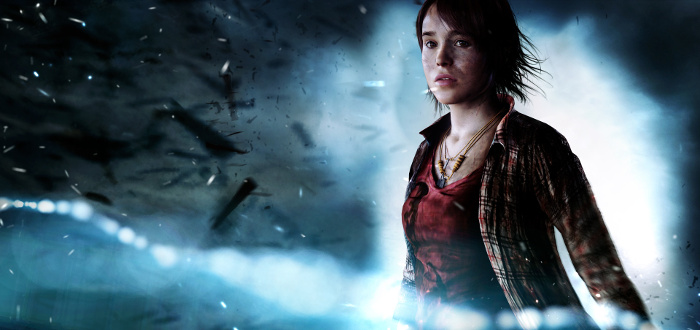
Interview: Guillaume de Fondaumiere – Quantic Dream
Just a few years ago, it was difficult to stay excited about games. Call of Duty had become the de facto product to define an entire medium, Final Fantasy was on it’s last legs and Leisure Suit Larry was getting a reboot. It was a dark, dreary, repetitive time to be a gamer that has recently become naught but a distant memory. The last three years have seen a resurgence of creativity and abandonment in the industry, spearheaded by the most influential indie movement in decades.Try to imagine games like Journey, The Walking Dead and Braid finding their way out of the mid-naughties greyscale epidemic. It’s not easy to do.
One studio that have consistently toyed with gaming conventions, although perhaps not so much with their colour pallets, are Quantic Dream. Their latest narrative experiment, Beyond: Two Souls, looks set to raise the storytelling bar even further than their last effort, 2010s Heavy Rain, and recently I got the chance to sit down with Guillaume de Fondaumiere, producer of Beyond, to talk about just how they planned to make that happen and what it could mean for the industry as a whole.

“I’ve been contacting Hollywood actors for years…”, he laughs when asked about the major hollywood heft behind the game. “…because I believe actors can contribute very strongly to the characterization in games. Before Heavy Rain I was very unsuccessful in convincing them that we were capable of not only re-creating their avatars in 3D but also in capturing their performance. We believe we can gain something by working with these talented people”
Beyond, as we mentioned in our preview last week, certainly has no shortage of talent behind it. Starring Willem Dafoe and Ellen Paige, with a score produced by Hans Zimmer, Beyond tells the story of Jodie Holmes; a girl who has spent her entire life tethered to a spirit named Aiden that only she can perceive. By following Jodie from the age of 8 players will see first hand how her life has been affected by Aiden and will also ultimately decide how the rest of it pans out. Where Heavy Rain was visceral, unforgiving and relentlessly real, Beyond is toying with the supernatural in ways Quantic Dream haven’t touched since Fahrenheit (where, some would say, it didn’t work out in their favor).

“It’s not been such a stretch…” Guillaume begins when asked about it, “Although you’re playing as this entity, Aiden, so there is a supernatural element, I think the game is none-the-less and the story is none-the-less very much grounded in what I would call reality. There’s a parallel world to ours, which is this spiritual world and you’ll have to discover what that is. Through Aiden you’ll have the possibility to interact as a creature from this parallel world into our world but Beyond is still about relationships, it’s about how our actions craft who we are and how certain decisions change the way our story, our journey, unfolds”.
The idea of choice and consequence isn’t new to fans of Quantic Dream’s previous work, but where Heavy Rain forced players to utilize critical thinking to make quick decisions, the story threads were pretty black and white in their conclusions. There was a bad ending where everything went to shit, a good ending where everyone rode off into the sunset and a couple of mediocre endings that just felt stunted and unsatisfying. I found out first hand that with Beyond, while the consequences of your decisions might not be immediately apparent, that certainly doesn’t mean they’re not coming.

“If we’re talking about choices and consequences, there’s probably one immediate difference between Heavy Rain and Beyond. In Heavy Rain, choices were laid out to the player in a very clear way. In Beyond we’re trying to explore choices and consequences in a more organic, less obvious way. We’re trying to explore what it means for players to naturally make certain choices based on their own intuition and see the story unfold almost naturally. We had user tests and it was very interesting, after user tests we usually put people together in a room who’ve played the game and ask them to exchange experiences. I remember having one discussion with one player who said that he had loved the experience but that ‘compared to Heavy Rain it was far more linear. I never felt that I was making choices. It was progressing logically but I didn’t see any choice‘ and as the discussion went on one of the other players said that his favorite scene was this bar scene and the first guy goes ‘woah woah…what bar scene?‘. That was very interesting to us because indeed there are certain scenes you’ll see or won’t see and multiple endings, over 20 endings. To certain people it’s probably going to appear more linear than Heavy Rain, but it’s not”.
As the conversation went on it got kind of hard to stay on track. Guillaume de Fondaumiere is clearly incredibly passionate about what he does and comes alive when talking about it. While I was hesitant to bring it up, there was something on my mind that I just couldn’t shake. The industry had come to rely on them, gamers had come to deride them and Quantic Dream seemed to love them but from what I’d played, Beyond didn’t seem to have very many of the dreaded, despised Quick Time Events that had angered so many in Heavy Rain and I couldn’t help but muse on how conscious a decision that was. Thankfully, it was something he was happy to talk about.

“We try to listen to our criticism but for us, most of the people who criticized the QTEs in Heavy Rain, most of them didn’t play it. They sat from the outside and criticized the graphical representation and the idea of the QTEs but if you were playing it it felt organic so we didn’t decide to change it as an answer to criticism but, firstly, we knew from the onset that Beyond would be a more action driven experience if only because you’re playing as both Jodie, the human character, but also Aiden who has supernatural powers. We found a system for the action sequences that we feel is superior to the one in Heavy Rain. I think the biggest difference that I see between the action scenes in Beyond and Heavy Rain is that we don’t have any visual interface anymore and I think to us that’s very important. Ideally we’d like no interface at all, hence also; almost no prompts. Whenever you need to interact with something you only see a simple dot. Everything else falls naturally and I think that’s a positive evolution”.

On the topic of positive evolution, I was curious as to how the studio felt about their female lead. The portrayal of women in games has been somewhat of a hot topic in the last few years and while it shouldn’t be considered a big deal to feature your female star prominently on your promotional material, the existence of a female character, completely free of sexualization, appearing on box art for a game she is the protagonist of is something that has been and should be celebrated, especially when certain other games this year have copped out of similar opportunities.
“I think as an industry we are sometimes the victim of some pre-defined schemes that hinder the progression of the medium. We had discussions with Sony that were quite easy to have because Sony have a very progressive approach, otherwise they wouldn’t publish our games from the onset, but yeah sometimes I’m very surprised by conversations I hear between other developers and marketing departments, fighting to put a woman on the front of the packaging. Don’t get me wrong, I’ve nothing against people in marketing departments, I’m just always surprised that certain people in our industry are so conservative, it’s important to open our perspectives”.
Eventually conversation beat journalistic integrity and our time descended into talking about different games that we’d enjoyed recently. We talked about the recent Tomb Raider re-boot and about how the team at Quantic Dream had enjoyed and taken inspiration from critical darling and personal favorite of mine, Journey. Guillaume also mentioned that while he hadn’t gotten around to finishing it, he had started The Last of Us and was very impressed by its pacing, characterization and narrative focus.
When I told him that I’d felt a strong Heavy Rain influence in TLOU, which I mentioned in my review, he was flattered, but unsurprised. “I think developers would themselves say that they’ve taken influence from Heavy Rain and to a certain degree I think we’re all inspiring each other. Whenever a game is successful that brings something new, in the case of Heavy Rain it was the narrative nature of the experience and emotion conveyed in the game, whenever these games are successful it encourages others to embrace new paradigms and take it as reference and say ‘okay, we can dare putting a story into the game, look at Heavy Rain it sold millions of units so it can’t be that bad‘. We are proud of that”.
There was a pause.
“I am surprised there are still so many QTE sequences in games since Heavy Rain. Tomb Raider is one very good example, The Last of Us, the Uncharted games etc. Heavy Rain got a lot of criticism from a certain fringe of gamers for this but it got awards too. [QTEs] are everywhere. It’s interesting”
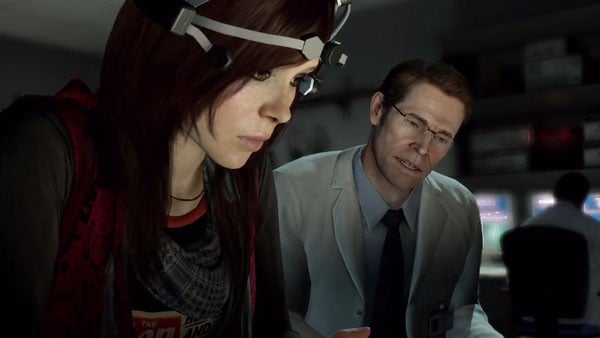
My time with Guillaume de Fondaumiere left me excited about not just Beyond: Two Souls, but also about gaming in general. As long as there are people as ambitious and devoted as he and his colleague David Cage, the medium will continue to thrive. “In general I think what we’re trying to do is create meaningful experiences and we believe that video games can be meaningful, can be a true form of cultural expression. We believe that gamers should be treated as adults, whether they’re actually adults or teenagers. We don’t want to infantilize them”.
Beyond: Two Souls releases on 11th October exclusively for Playstation 3.
